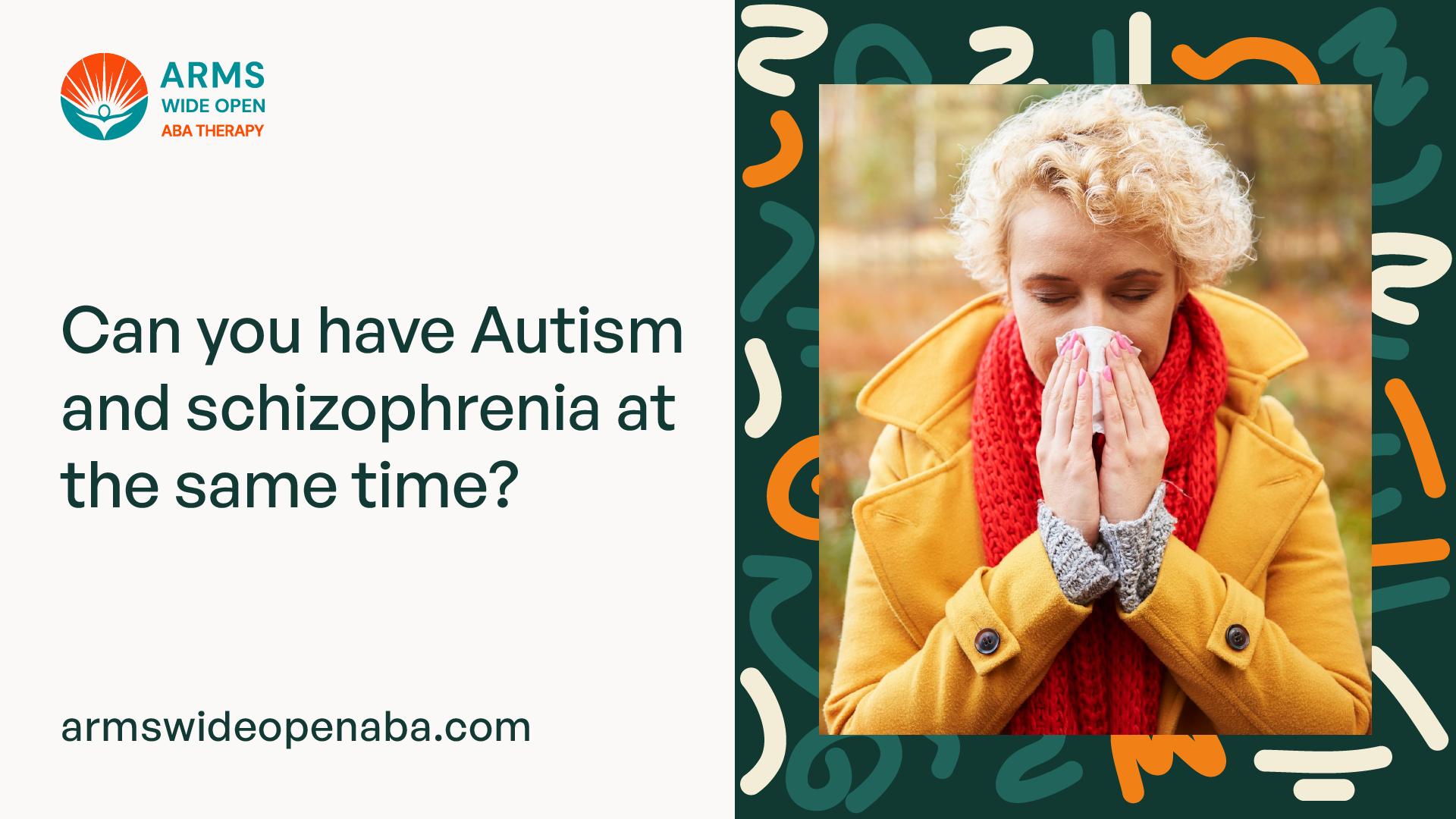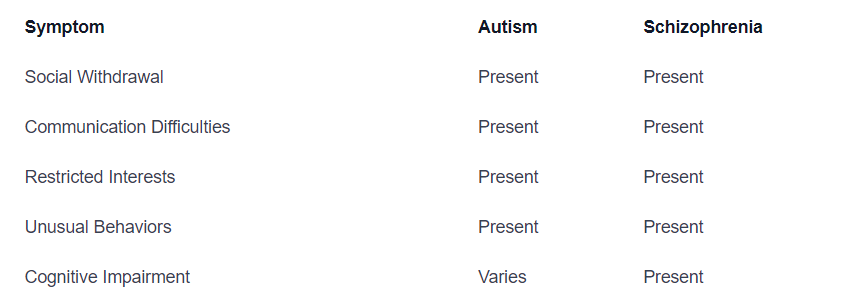Can you have Autism and schizophrenia at the same time?
Unraveling the connection: Can autism and schizophrenia coexist? Explore the overlapping symptoms, genetic influences, and treatment considerations.

Understanding Autism and Schizophrenia
To unravel the connection between autism and schizophrenia, it is important to first understand each condition individually and then explore their coexistence.

What is Autism?
Autism, or autism spectrum disorder (ASD), is a neurodevelopmental disorder that affects social interaction, communication, and behavior. It is typically diagnosed in early childhood and can vary in severity, with individuals experiencing a wide range of symptoms and challenges.
Autism is characterized by difficulties in social interaction, such as impaired nonverbal communication skills, challenges in developing and maintaining relationships, and a preference for routine and repetitive behaviors. Other common symptoms include sensory sensitivities, restricted interests, and difficulties with verbal and nonverbal communication.
What is Schizophrenia?
Schizophrenia is a chronic mental disorder that affects how a person thinks, feels, and behaves. It often emerges in late adolescence or early adulthood and can significantly impact various aspects of a person's life.
The symptoms of schizophrenia can be categorized into positive symptoms (delusions, hallucinations, disorganized thinking), negative symptoms (reduced emotional expression, social withdrawal), and cognitive symptoms (impaired thinking, attention, and memory). These symptoms can vary in severity and can have a significant impact on an individual's ability to function in daily life.
Coexistence of Autism and Schizophrenia
While autism and schizophrenia are distinct conditions, research has shown that they can coexist in some individuals. This coexistence, known as the "comorbidity" of autism and schizophrenia, is not fully understood and poses unique challenges for diagnosis and treatment.
Studies have found that individuals with autism are at a higher risk of developing schizophrenia compared to the general population. The prevalence of schizophrenia in individuals with autism is estimated to be higher than in the general population, although the exact numbers vary across studies.
Coexistence of autism and schizophrenia presents unique diagnostic challenges, as the symptoms of both conditions can overlap. It can be difficult to differentiate between the two disorders, especially when individuals experience communication difficulties or have limited insight into their symptoms.
Understanding the coexistence of autism and schizophrenia is an area of ongoing research, and further studies are needed to elucidate the underlying mechanisms and potential shared genetic, environmental, and neurological factors.
By gaining a deeper understanding of autism and schizophrenia individually, we can begin to explore the complex relationship between these conditions and how they manifest in individuals who experience their coexistence.
Overlapping Symptoms and Challenges
When it comes to the coexistence of autism and schizophrenia, there are certain overlapping symptoms and unique challenges that individuals may face. Understanding these similarities and difficulties is crucial in providing appropriate diagnosis and treatment.
Similarities in Symptoms
Autism and schizophrenia share some common symptoms, which can make it challenging to differentiate between the two conditions. These overlapping symptoms include:

It is important to note that while some symptoms may present in both conditions, the severity and specific manifestation can differ. Additionally, there are also symptoms that are more specific to each condition, which aids in distinguishing between autism and schizophrenia.
Challenges in Diagnosis and Treatment
Diagnosing and treating individuals who exhibit symptoms of both autism and schizophrenia can be complex. Some of the challenges include:
- Diagnostic Confusion: The overlapping symptoms can lead to misdiagnosis or delayed diagnosis, as it can be difficult to differentiate between autism and schizophrenia solely based on clinical presentation.
- Heterogeneity of Symptoms: The symptoms and their severity can vary greatly among individuals with both conditions, making it challenging to create a standardized diagnostic criteria or treatment approach.
- Comorbidity Complexity: The presence of both conditions can complicate treatment plans, as the symptoms and treatment goals may differ for each condition. It requires a multidisciplinary approach involving psychiatrists, psychologists, and other healthcare professionals to develop individualized treatment strategies.
- Medication Considerations: Selecting appropriate medications for individuals with coexisting autism and schizophrenia requires careful consideration. Some medications used to manage symptoms of schizophrenia may have adverse effects on individuals with autism, and vice versa.
- Support and Services: Individuals with both conditions may require specialized support and services that cater to their unique needs. This includes access to therapies, educational resources, and community support groups that are well-equipped to address the challenges associated with both autism and schizophrenia.
Efforts are being made to improve the diagnostic accuracy and treatment outcomes for individuals with coexisting autism and schizophrenia. Further research and advancements in understanding the underlying mechanisms, genetic factors, and neurobiological differences will contribute to better diagnostic tools and more targeted treatment approaches. By addressing the overlapping symptoms and challenges, healthcare professionals can provide effective support and care for individuals with this dual diagnosis.
Shared Genetic and Environmental Factors
The coexistence of autism and schizophrenia raises questions about the potential shared genetic and environmental factors that contribute to the development of these disorders. Understanding these influences can provide valuable insights into the underlying mechanisms and help guide diagnosis and treatment approaches.
Genetic Influences
Both autism and schizophrenia have a strong genetic component. Studies have shown that individuals with autism are more likely to have relatives who also have autism or related conditions, suggesting a hereditary component. Similarly, individuals with schizophrenia often have a family history of the disorder.
Genetic studies have identified several genes that are associated with both autism and schizophrenia. These genes play a role in brain development, synaptic function, and neurotransmitter signaling. However, it's important to note that the genetic overlap between the two conditions is complex and not fully understood. Further research is needed to elucidate the specific genetic variants and their contributions to the coexistence of autism and schizophrenia.
Environmental Triggers
In addition to genetic factors, environmental influences also play a role in the development of autism and schizophrenia. Environmental triggers can interact with genetic susceptibility, potentially increasing the risk of developing these disorders.
Various environmental factors have been explored in relation to autism and schizophrenia. Maternal infections during pregnancy, exposure to certain toxins or chemicals, and prenatal complications have been identified as potential risk factors for both conditions. However, it's important to note that these factors are not deterministic and do not directly cause autism or schizophrenia. They may increase the vulnerability to developing these disorders in individuals who are already genetically predisposed.
Understanding the interplay between genetic and environmental factors is crucial in unraveling the complexities of autism and schizophrenia. It highlights the need for a comprehensive approach to diagnosis and treatment, taking into account both the individual's genetic profile and their environmental exposures.

By exploring the shared genetic and environmental factors in autism and schizophrenia, researchers can gain a deeper understanding of the complex relationship between these two conditions. This knowledge can inform future research efforts and potentially lead to more targeted and effective interventions for individuals who experience the coexistence of autism and schizophrenia.
Neurological and Cognitive Differences
When exploring the coexistence of autism and schizophrenia, it is essential to examine the neurological and cognitive differences that are observed in individuals with both conditions.
Brain Structure and Function
Research has shown that both autism and schizophrenia are associated with alterations in brain structure and function. However, the specific patterns and regions affected can differ between the two disorders.
In individuals with autism, studies have revealed abnormalities in brain regions involved in social communication and sensory processing. These include the prefrontal cortex, amygdala, and superior temporal gyrus. Additionally, connectivity between different brain regions may be atypical, leading to difficulties in integrating information and processing social cues.
On the other hand, schizophrenia is characterized by abnormalities in brain regions involved in perception, cognition, and emotion. These include the prefrontal cortex, hippocampus, and striatum. Alterations in neurotransmitter systems, such as dopamine and glutamate, have also been implicated in the development of schizophrenia.
While there may be some overlap in brain regions affected, the specific patterns of structural and functional differences in autism and schizophrenia highlight the unique nature of each disorder.
Cognitive Abilities and Deficits
Cognitive abilities and deficits can vary significantly in individuals with coexisting autism and schizophrenia. Autism is often associated with strengths in certain cognitive domains, such as attention to detail, pattern recognition, and memory. However, individuals with autism may also experience challenges in areas such as social cognition, executive functioning, and flexibility in thinking.
Schizophrenia, on the other hand, is typically characterized by cognitive deficits across multiple domains. These deficits can include impairments in attention, working memory, information processing speed, and executive functions. Difficulties in social cognition and theory of mind, which involve understanding the thoughts and intentions of others, are also commonly observed in schizophrenia.
It is important to note that the cognitive abilities and deficits in individuals with both autism and schizophrenia can vary widely. Each person's profile is unique and may be influenced by factors such as the severity of symptoms, comorbid conditions, and individual strengths and weaknesses.
Understanding the neurological and cognitive differences in individuals with coexisting autism and schizophrenia can contribute to improved diagnosis and treatment strategies. By recognizing the specific challenges and strengths associated with each disorder, healthcare professionals can provide more tailored interventions and support to individuals who navigate the complexities of both conditions.
Treatment Considerations
When it comes to addressing the coexistence of autism and schizophrenia, treatment considerations are multifaceted. Each individual's needs are unique, and a personalized approach is crucial for effective management. Two key treatment considerations for individuals with both autism and schizophrenia are individualized approaches and multidisciplinary care.
Individualized Approaches
Given the complex nature of autism and schizophrenia, treatment plans must be tailored to the specific needs and challenges of each person. What works for one individual may not work for another. Individualized approaches take into account the individual's symptoms, strengths, and preferences to create a treatment plan that addresses their unique combination of autism and schizophrenia.
Treatment approaches may include a combination of medication, therapy, and supportive interventions. Medication can help manage symptoms such as psychosis, anxiety, and mood disturbances associated with schizophrenia. Behavioral therapy, such as cognitive-behavioral therapy (CBT), can help individuals develop coping strategies and improve social and communication skills often affected by autism. Individualized approaches recognize the importance of considering both autism and schizophrenia symptoms in the treatment plan.
Multidisciplinary Care
Addressing the complexities of autism and schizophrenia often requires a multidisciplinary approach involving a team of healthcare professionals. This team typically includes psychiatrists, psychologists, neurologists, speech therapists, occupational therapists, and social workers. Collaboration among these professionals ensures that all aspects of the individual's condition are considered and addressed.
In multidisciplinary care, each professional brings their expertise to the table, contributing to a comprehensive understanding of the individual's needs. This collaborative approach allows for the development of a holistic treatment plan that takes into account the interconnectedness of autism and schizophrenia symptoms.
Furthermore, multidisciplinary care provides ongoing support and monitoring. Regular follow-up appointments allow for adjustments in treatment as needed and provide a safe space for individuals to express their concerns and challenges. The collective knowledge and expertise of the healthcare team contribute to the overall well-being and quality of life for individuals with both autism and schizophrenia.
By adopting individualized approaches and implementing multidisciplinary care, individuals with the coexistence of autism and schizophrenia can receive comprehensive treatment that addresses their unique needs. As research continues to advance, further insights into effective treatment strategies for this complex overlap of conditions can be gained, leading to improved outcomes and better support for individuals living with both autism and schizophrenia.
Future Research and Insights
As our understanding of autism and schizophrenia continues to evolve, ongoing research is shedding light on the coexistence of these two conditions. Advancements in understanding the relationship between autism and schizophrenia hold promising implications for diagnosis and treatment.
Advancements in Understanding
Recent research has provided valuable insights into the complex interplay between autism and schizophrenia. Scientists are uncovering genetic and environmental factors that contribute to the coexistence of these conditions. By studying the overlapping symptoms, shared genetic influences, and neurological differences, researchers are gaining a deeper understanding of the connections between autism and schizophrenia.
Advancements in technology and imaging techniques have allowed researchers to explore the structural and functional differences in the brains of individuals with autism, schizophrenia, and both conditions. These studies have revealed alterations in brain connectivity, neurotransmitter systems, and neural networks, providing important clues about the underlying mechanisms.
Additionally, researchers are investigating the role of cognitive abilities and deficits in individuals with both autism and schizophrenia. By studying cognitive processes such as attention, memory, and social cognition, scientists aim to unravel the complexities of these conditions and identify potential targets for intervention.
Implications for Diagnosis and Treatment
The growing body of research on the coexistence of autism and schizophrenia has significant implications for diagnosis and treatment. Improved understanding of the shared symptoms and challenges in diagnosing these conditions can lead to more accurate and timely identification of individuals who may have both autism and schizophrenia.
Early detection and diagnosis are crucial for providing appropriate interventions and support. With increased awareness of the coexistence of these conditions, healthcare professionals can implement comprehensive assessments that consider the overlapping symptoms and cognitive profiles.
Individualized approaches to treatment are essential when addressing the complex needs of individuals with both autism and schizophrenia. Multidisciplinary care involving psychiatrists, psychologists, occupational therapists, and other specialists can provide a comprehensive treatment plan tailored to the unique needs of each individual.
The insights gained from ongoing research can also inform the development of targeted interventions and therapies. By understanding the specific brain differences and cognitive abilities of individuals with both autism and schizophrenia, researchers can explore innovative approaches to improve outcomes and enhance quality of life.
As research continues to advance, it is hoped that the knowledge gained will contribute to improved diagnostic accuracy, more effective treatment strategies, and enhanced support for individuals who experience the coexistence of autism and schizophrenia.
Sources
https://www.medicalnewstoday.com/articles/can-you-have-autism-and-schizophrenia-at-the-same-time
https://www.healthline.com/health/autism-vs-schizophrenia
https://www.ncbi.nlm.nih.gov/pmc/articles/PMC8931527/
Similar articles
We’re here to help you

Our team is here to assist you in this process. Contact us for any assistance.
it’s easy to apply
We Accept Most Insurances
Our in-network insurance partnerships make ABA therapy more accessible to families throughout our service areas.







Our Insurance Process
We'll request your insurance details to help us verify your plan's coverage for ABA therapy. Once we've received this information, we'll walk you through your benefits, including copayments, deductibles and out-of-pocket maximums, so you know what to expect in advance.
Our team will then handle the preauthorization and all the necessary paperwork.
.svg)





















.jpeg)


































.jpeg)




.jpeg)







.jpeg)











.jpeg)
















